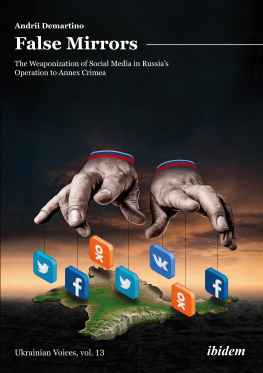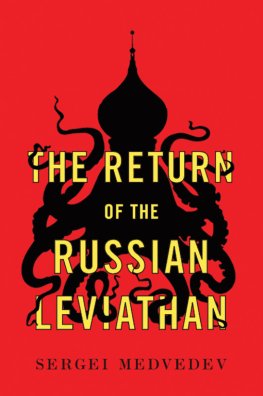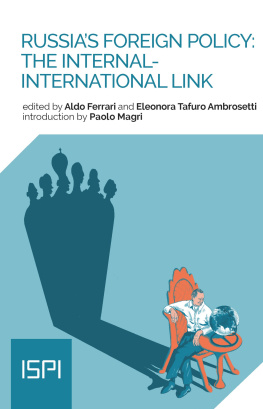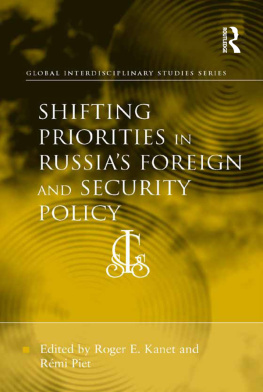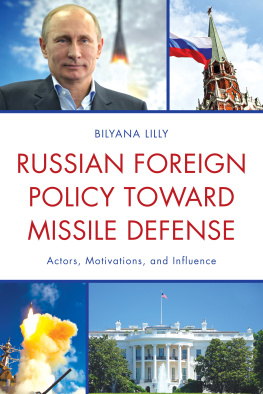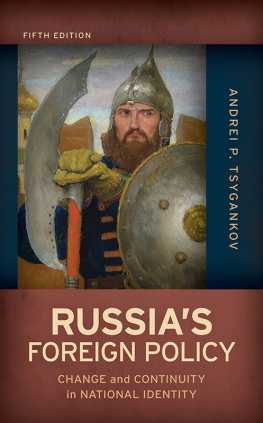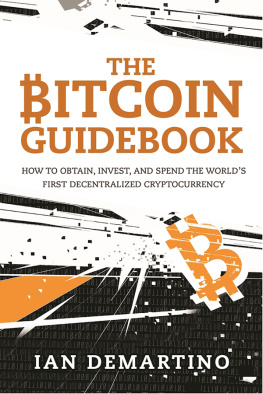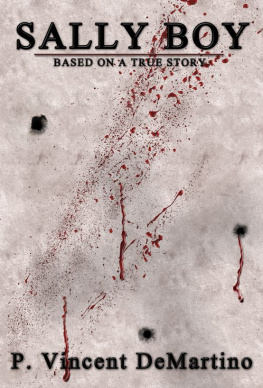ibidem -Press, Stuttgart
Contents
Foreword
The attempt to annex Crimea and Russias military invasion of eastern Ukraine in 2014 have become an unprecedented challenge to the global security system, an act of open aggression against a sovereign state. Being the result of the implementation of aggressive foreign policy strategies by the leadership of the Russian Federation, these events were certain to attract the close attention of scientists and researchers in various fields. For the first time since the end of World War II, the leadership of one of the countries in Europe has planned and conducted a full-scale military operation based on modern principles of warfare.
As the use of nuclear weapons is becoming increasingly problematic, the confrontation will gradually but steadily focus on information and cyberspace, space and biotechnology. The techniques for information and psychological influence as part of a new type of hybrid warfare pose a particular danger, which has been clearly demonstrated in Crimea and parts of the Donetsk and Luhansk regions.
Modern challenges require an adequate response. The research of the author of The False Mirror on the role of social media in the Russian operation to attempt the annexation of Crimea will help to devise such countermeasures. The value of this study lies in the authors focus on analysing real facts and reconstructing the sequence of events, which are looked at in the context of information warfare, one of the important elements of which is the use of social media.
The book examines the specific techniques and methods of using popular social media by Russian intelligence agencies before, during, and after the temporary occupation of Crimea. Using modern channels of communication, Russian special services distorted the events, falsified information, and created a favourable information environment for the military operation.
The study highlights the danger of the information component of warfare and emphasises the obligation of the state to be prepared, both technologically and organisationally, to resist hostile information influence. The materials collected and analysed by the author have not only historical value: the book contains practical recommendations for countering information and influence operations, which can be used in government decision-making.
Oleksiy Danilov
Secretary of the National Security
and Defence Council of Ukraine
Kyiv, April 2021
Abstract
The thesis about the importance of the information component as one of the key elements of the so-called ne w- type warfare became generally accepted after the annexation of Crimea and the occupation of the parts of the Donetsk and Luhansk regions by the Russian Federation in 2014. At the same time, studies in this field often rely on rather limited sources, tend to use overly theoretical approaches, and repeat the same facts and conclusions. Consequently, a wide range of practical techniques and methods of Russian information influence have not received sufficient attention.
This study investigates the techniques of using social media to fulfil aggressive foreign policy tasks, as exemplified by the Russian Federations operation to annex the AR of Crimea in 2014.
Analysing the level of information effectiveness of the Crimean operation, it is worth noting the synergy effect produced by combining the use of social media with the broader Russian ant i- Ukrainian propaganda campaign. In this case, social media, which were trusted, and where the information received from other sources (primarily television) was verified, have played the role of a false mirror, which falsified the information. That, in turn, has produced the effect of double manipulation, via television and social media, thus creating the environment of lies.
Based on the analysis of the techniques for Russias information influence, this study offers effective countermeasures, which may be taken into consideration when formulating the national information policy in Ukraine and other states.
Keywords: the Autonomous Republic of Crimea, the AR of Crimea, annexation, social media, the Russian Federation, hybrid warfare, new-type warfare, information operations, information influence, fakeaccounts.
Introduction
The annexation of the Autonomous Republic of Crimea (AR of Crimea) by the Russian Federation (RF) in 2014 has posed an enormous challenge to the world not only in terms of politica l- military affairs but also in terms of scientific research. The issues of new-type warfare, the s o- called hybrid warfare or nonlinear warfare (see Smola, 2016, pp. 68-71, for more detail), which have been discussed in the scientific community for a long time, have become a reality in Ukraine.
The cyberattacks on Estonia in 2007 and the information and military operations in Georgia in 2008 were, inter alia, the demonstration of the RFs hybrid/nonlinear capabilities. The phenomenon of new-type warfare, which has manifested itself on a large scale during the Russian aggression against Ukraine, requires consideration and systematic analysis.
In this context, one should remember the s o- called Gerasimov Doctrine when the article by the Chief of the General Staff of the Armed Forces of the RF, First Deputy Defence Minister, Valery Gerasimov, published in February 2013 with the title The Value of Science Is in Prediction, in which he presented the concept of new-generation war, was interpreted as a revolutionary military theory (Adamsky, 2015). In fact, it was the British political analyst Mark Galeotti who coined the term Gerasimov Doctrine as a title for his blog post, in which he published the article by the Russian top military officer. However, later Galeotti (2018) was genuinely surprised that people believed that the tough Chief of the General Staff rather than a theoretician had managed to conceive the doctrine and regretted that his marketing stunt had such unintended consequences.
By contrast, the American military expert Michael Kofman (2018) believes that the Gerasimov Doctrine is nothing but a myth and that no doctrine exists. In Kofmans opinion, the article by Gerasimov offers the interpretation of the American approach to political and military confrontation, which was perceived as formulating a new Russian doctrine of fighting the West. Such reaction is quite typical of those politicians and members of the military who are looking for simple answers and noticeable details to explain what is going on, the researcher concludes.
The Deputy Director of the Polish Center for Eastern Studies, Jolanta Darczewska (2014), holds the same opinion, making a point that the Russian theory of information warfare has been developed in opposition to the existing concepts of ne w- generation warfare as a response to the activities against Russia.
This view is supported by the Information Security Doctrine of the Russian Federation, which mentions the elaboration by a number of states of the concepts of information wars that envisage the creation of means of dangerous influence on the information spheres of other countries of the world among other threats to the national security in the information sphere (Institute of Contemporary Development, 2016).
However, the discussion around the article by the Russian general is illustrative of both the relevance of the very phenomenon of ne w- type warfare and the range of terminological, legal, methodological, and other problems arising out of it. The advent of the information technology age, which has created unprecedented opportunities but, at the same time, caused unforeseen problems, has further complicated the situation. For example, historians have to adopt old research methods while being in entirely new conditions, such as working with sources that are continuously updated and under the eve r- present threat of their immediate deletion. Therefore, on the one hand, scholars have to advance their research carefully, scrupulously gathering facts and developing new methods, but on the other hand, they have to adapt to new circumstances quickly. As the famous futurologist Bruce Sterling wittily put it, by the time you legally define what a browser is, the browser war is all over.

